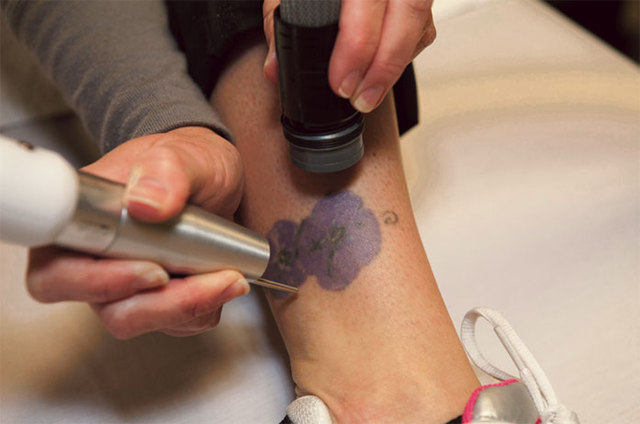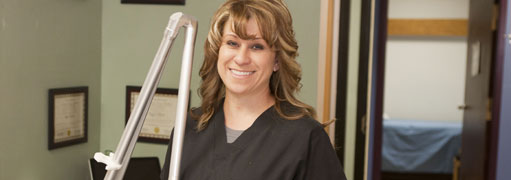Sara is working on healing, on changing. But she can’t escape the names. Old boyfriends. People who in another life seemed important. They’re tattooed on her body. "My pimp, he made me put it on me," she says. "I’ve had that since I was 15." And every time she had a new romantic relationship, "I put another person’s name on me." Sara—not her real name—is climbing out of those old, dark days. She checked herself into Maya’s Place, a living facility where she has access to medical care, substance abuse treatment, mental health treatment and counseling. She wasn’t thinking much about her tattoos. But within weeks of coming to Maya’s Place, she heard of the removal program. At first, she didn’t see why people would bother with it. "I thought, I’ve had them forever, so it doesn’t matter. But it does matter. You’re letting go of past relationships, gangs, whatever. I don’t even associate with those people anymore. They’re not in my life."Sheila Ciminera is the senior case manager with Crossroads for Women, the re-integration program that oversees Maya’s Place. As the women get back on their feet, they find their own apartments and continue to avail themselves of the services at Crossroads for Women. "Our ultimate goal is for our clients to achieve self-sufficiency," says Ciminera.She says her clients have turned their backs on their old lifestyles. "A lot of them get tattoos during the hard times in their lives. It could be a gang affiliation. They’ve worked very hard to move past that. But people automatically judge them based on their appearance."There’s a stigma surrounding visible tattoos, and it’s a big obstacle when trying to reintegrate into society, she says. "These women just really want to be part of the community and give to the community, and many of them are looked down on because of their tattoos."Being stamped with a troubled past isn’t helping Sara find a job. Plus, the deck is already stacked against her, she says, as a former addict and an ex-con. "They judge who I was, not who I am." More than 40 percent of Americans between the ages of 26 and 40 have a tattoo, according to the Pew Research Center. A Harris Poll shows that 84 percent of people who have one don’t regret it. Still, laser tattoo removal is on the rise around the country.Dawn Maestas is co-owner and laser tech at Lazarus Tattoo Removal, a South Valley business that’s been erasing ink for Crossroads’ women at a reduced cost for about a year. She says the procedure is considered cosmetic, and most of the time, it is. But there’s a deep psychological healing that can come from removal, she adds, especially if the mark is borne of a violent situation. Some people are forcibly tattooed: Maestas says one young client was tattooed without her permission by gang members. Tattoos and sexual assault can go hand in hand, and sometimes a woman’s vaginal area is tattooed by the person who attacked her. "Can you imagine having to undress every day and having a visible sign of what you endured?" Maestas asks. "In some situations, they’re just tattoos," she says. "In others, they’re not. It’s a way to brand someone or mutilate them."Maestas says her job is only partially about fragmenting pigment with a laser. Removing a rapist’s mark, for instance, requires more time because she has to help the client work up to the procedure. It’s an emotional process. "When you’re in my office, it’s not so much about removing tattoos. It’s about watching a beautiful transformation take place,” Maestas says. “I respect that, above and beyond. To bear witness to it is amazing to me. I couldn’t imagine doing another job." Some Crossroads clients are OK with their ink, Ciminera says, but most want to erase it from their hands or face or neck. It’s also hard when, as for Sara, the associations are negative. "We have people who, for example, come from domestic violence situations and had their abuser’s name tattooed on them. You know, it’s a very important part of their healing to get something like that removed." Maestas is not against tattoos generally and even has a few herself. They’re lovely, she says, and they represent who she is. But that’s not everyone’s experience. Jackie—again, not her real name—is in the process of having the letters CTR removed from two places on her body. The letters, in cursive on her wrist and Old English on her arm, stand for "Crazy Town Roswell." Each session is quick, she says. The numbing process of chilling the skin hurts more than the laser, she says. Jackie also says she likes some tattoos. "There’s some good art out there," she says. "All mine are from prison, and they don’t look too good."The 40-year-old Crossroads client estimates that she got the tats in prison about 15 years ago. She’s starting school. When she’s done, she wants a career. And she has grandkids now. "I don’t want to be the grandma with tattoos all over my body."Ciminera says sometimes women are judged for their missteps. "A lot of times, people will say, Well, they chose to get these tattoos, so they need to deal with it. But I think everyone’s made mistakes in their lives."
Donate by mailing a check to: Crossroads for Women805 Tijeras NWAlbuquerque, NM87102Or online:crossroadsabq.orgBe sure to indicate “tattoo removal.”For more information, call Sheila Ciminera at 242-1010.







